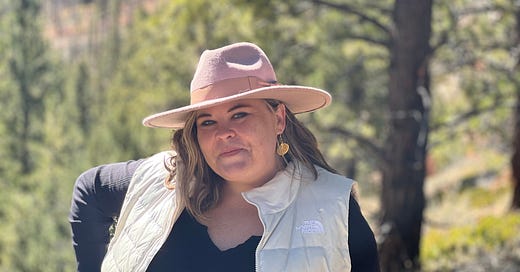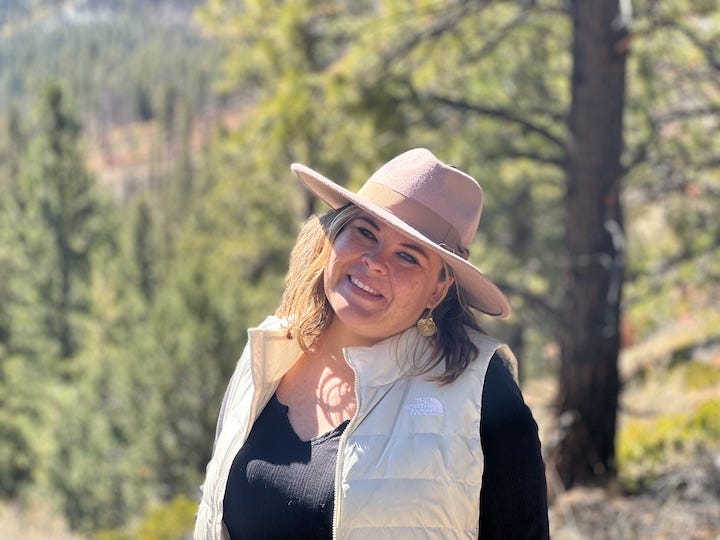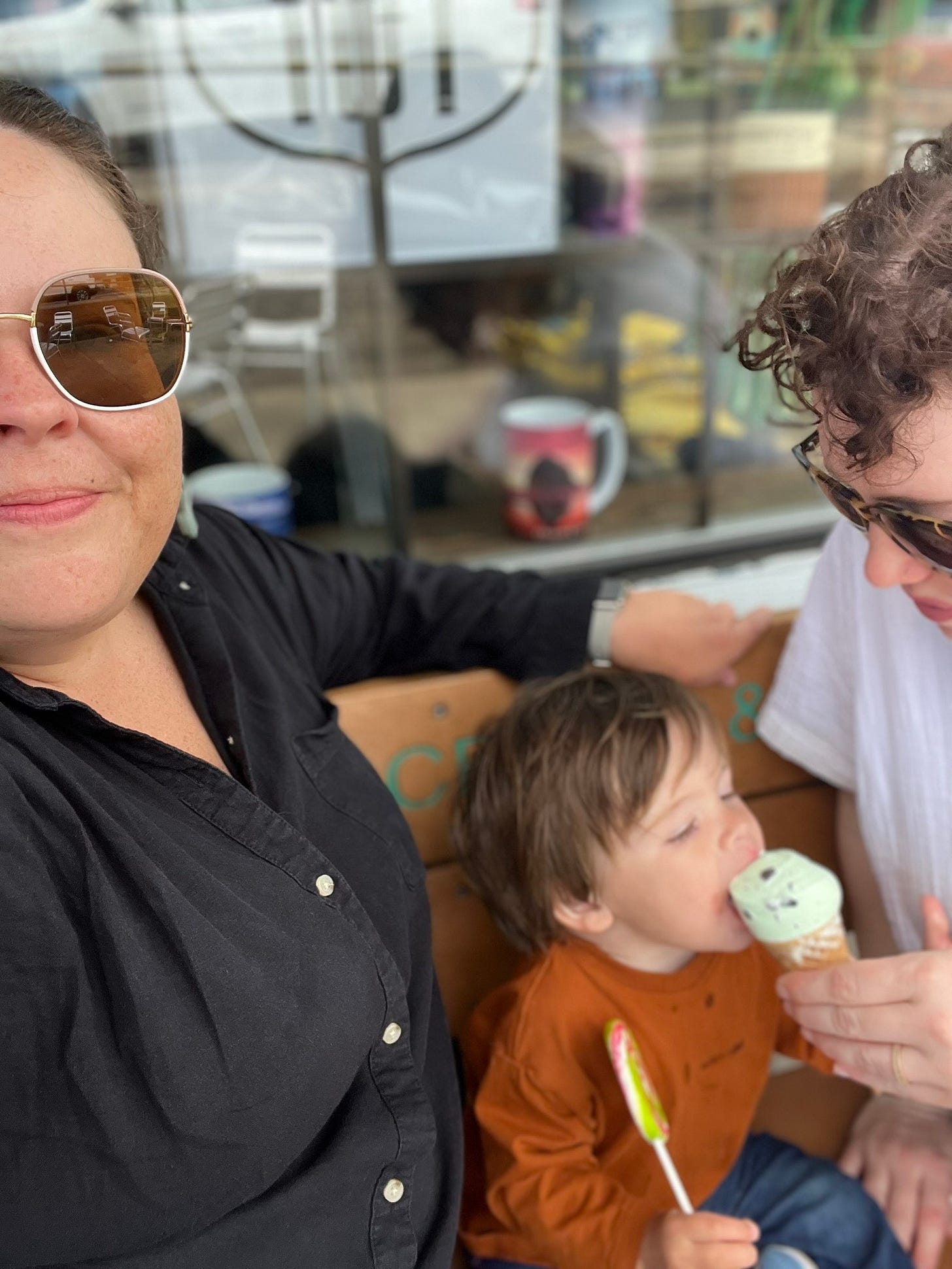Are Happy Families REALLY All Alike?
A conversation with Better Life Lab’s Haley Swenson on her new Happy Families Substack

“All happy families are alike; each unhappy family is unhappy in its own way”
-Leo Tolstoy
I switched to full-time freelance writing in early 2017 - after Trump had won the election and my time in the Obama Administration had come to an abrupt end. Writing made sense - it offered a chance to be flexible with my schedule. With young children at home, this was the wise course of action.
But the problem of being a freelance writer was that I often lacked for collaborators - the kind of high quality editors who get to know you and your work, who can hem and haw along with you about story ideas and whether policy pieces were too wonky, or whether dark pieces about white supremacists could receive legal blowback (yes, true conversation).
So enter Haley Swenson. Haley worked at the Better Life Lab back when we had a channel with Slate, and became one of my favorite and most beloved editors. She had the writing smarts to make sure a story was clean, researched and timely, and the empathy and insight to be someone whose calls and emails I always answered. She also was one of those lovely editors who makes sure that the checks are never lost in the mail.
Haley Swenson, Utah-native, gender-expert, new(ish) mom, brand new Substacker and all-around badass. (photo courtesy of Haley Swenson)
Haley wound up bringing me into the fold at Better Life Lab, and when she stepped away from her full time role in early 2023, I began taking on more responsibilities, including the child care reporting grants, based on a previous project that she and Brigid Schulte had worked on together on paid family leave.
Haley is still writing though - she’s married, became a mom, and is using her PhD in gender studies to help us all rethink some of our outdated notions about what “family” entails. So when she told me she was finally starting a Substack I knew that I wanted the chance to interview her.
And I highly recommend people sign up to read it here!
Our lightly edited Q+A is below:
Q. So you are starting a Substack! I’m excited for you and I’m also excited to start subscribing and reading myself. Tell me what it’s about?
I named it provocatively, Happy Families. There’s a lot of pretty negative talk about the trajectory of the family for a variety of reasons, but I’ve found that on the individual level people feel pretty good about what they are doing in terms of raising kids and taking care of each other. If you listen to the conservative idea of family, it’s this: a breadwinner and homemaker and they need to have traditional family values. By that standard, we’re currently failing. But what's going on in our actual lives across the political spectrum? Because I don’t think most families are living by those old, conservative standards. What is the kind of new family values that we are creating, and what are the things that are standing in our way? Because the things the right wing, in particular, is talking about as barriers to family happiness, are things like this anti-LGBT panic, bathroom bills and rogue teachers, affecting our children. And when you look at polling, that's really just not reflective of the real concerns that people have about their families.
So this is the beginning stage of this project. I've obviously been scouring research on this for many years, but I wanted to have a home base to put all that information about where we stand today when it comes to family values and family happiness.
Haley, son Leif, and wife Alieza (photo courtesy of Haley Swenson)
Q. So why do you think conservatives have family values cornered as something that they are really espousing? How did that happen?
In a lot of ways, it's been something progressives have ceded the ground on. In part that’s because we've had - and I'm saying ‘we’ here as a feminist - a lot of critiques to make of the traditional family. Talk of family values and discourse about protecting families came second to things that seemed more paramount in the moment, like civil rights, human rights, and the ability for people to flourish. And so we've targeted the patriarchy of the family and the rigidity of families that have led to the rejection of LGBTQ people. And as a result of that, we’ve left conservatives to hold the ground on this idea that they are the ones protecting and championing the family.
Meanwhile, people across the spectrum have actually been building families and caring about families and valuing that and developing really new and I think exciting ideas about what a family should be and do.
The other thing is that conservatives play on people's sense of nostalgia. The historian Stephanie Coontz has written a whole book about this. It’s really easy to imagine that families of the past were happier, more stable, etc. And to do that, you really have to disregard all the things I just talked about, about the reason people have been pushing against rigid ideas of family life that have actually hurt people and made it harder for people to flourish. But counting on that nostalgia can be really politically powerful, and I think it’s why the right talks so much about the family.
That's something I really want to explore. I want people to be a little more skeptical when people label themselves as “pro-family.” What are they actually trying to accomplish at a political and economic level? Because sometimes those things might be good for “the traditional family,” but not great for real families.
Q. You talk about how people don't always see some of these different types of families, and yet you live in a red state, you have a young child, you're married to a woman. How has this evolved your own understanding of family, and what it means to have a different perspective on what that looks like, especially with people who may have the more traditional background and ideas as to what family looks like?
A. I think my own personal upbringing has been really central to this, because I grew up, as you said, in a red state, in Utah, almost the reddest of red states. And if you look at family statistics on divorce rates or number of children, Utah has been a bit of an outlier. Its families have looked more traditional.
And as a young person, I was responding to that like, ‘get me out of here.’ I didn't come out as queer until I was almost 30, and I left the state. I wanted to explore questions around patriarchy, and I always tell people that in Utah, patriarchy isn't subtext, it's text, because Mormonism is very explicit that men are heads of household, and they “preside” over the family, that's the language that's used, and that women are their helpmeets and their nurturers, and the ones responsible for the household. I really responded negatively to that. It wasn’t what I valued, or frankly, what my family of origin valued.
I got out and went to college and grad school and studied these issues as a PhD in women's studies. Yet I found myself incredibly drawn both to my family of origin, who I've now moved back to as a result of the pandemic, and to starting my own family.
And yes, doing it on my own, I like to think, queer, feminist way, but also doing it in a way that brings back some of the things my own family of origin, which was heterosexual and loosely Mormon, really valued things like play, curiosity, unconditional love and support. Those are things that I've tried to replicate, and I've seen I'm not alone.
A lot of my friends that I have known through things like grad school and really radical political organizing also truly value families, and I want to give thanks to that, and more attention to it, and more life, and see what we can actually come up with in terms of speaking about a new framework for family and what that means.
Haley and Alieza at their 2020 wedding in Bryce Canyon, Utah, red state be damned.
Q. I love the example you gave about the different values that you've been able to bring back. So you talked about something about families needing more support. And I know I write a lot about this too. What are some of the supports that you’re targeting here, and how has that evolved for you now that you are a parent?
A. I have a 16 month old, so I feel like I'm actually quite new to the parenting game. And I'm currently doing this interview while walking my 16 month old around the neighborhood so that my wife can take a nap.
When I first came to work in New America right out of grad school, I learned so much about the social safety net policies the US lacks compared to other countries. And that’s a huge difference for families that live in this country. Child care is a big part of it, as you have reported on so thoroughly. It's really brutal for parents trying to navigate working lives, to do that with very young children in this country is so difficult, and it doesn't need to be.
I think it's almost punishing the way that the system is set up, not only that it's incredibly expensive, but it's so unreliable. And that realization of the lack of reliability is something I didn't fully appreciate until I had my baby. I've been working on paid family and medical leave since about 2017 as well. Our country doesn't say you're entitled to have time off from work to care for yourself, without experiencing extreme financial duress. It says something quite sad about our current family value system, at least as it's reflected within the government. Those are the big ones.
But to me, I think what's become clear in my parenthood journey is that it's not just about the lack of the policies. It's a way of thinking about the relationship between the public and then private families that is so damaging and limiting and isolating.
As an example of this, I just saw a Wall Street Journal report about the number of people who increasingly want no children, and they have a lot of reasons, but many of them are financial, you know, at least related financially, how expensive. And you know, there's a lot of handling in the comments about ‘people missing out on such a wonderful opportunity’ and ‘people are so selfish these days.’ and ‘don't have kids you can't afford.’
This has been our country's answer to parents asking for help for so long. I have no investment in making people who don't want to have children have children, but I do think a lot more people might be open to it if child care were something they could afford.
Q. So in all your time reporting on these policies and talking with people - and now as a parent - what have you found that resonates with people the most, either to be engaged on these issues or even change their mind?
A. Really early in the pandemic, I happened to talk here on the NPR show, the 1A, to talk about the child care crisis that was unfolding. And I had been just cramming like crazy ahead of it, and I remember I had seen something really striking about how little had been spent on childcare to that point. This was before the American Rescue Plan, and I think it was $3 billion for childcare. And you tell people that $3 billion, and it sounds like so much money, right? But then the second thing I said is, well, how much is the federal government spending to save the airline industry? It was already something like $13 billion. And $5 billion of that specifically went to Delta, to one private company. So I think when you talk broadly to people about government spending for families, they go, ‘well, you know, we have to be really cautious about how we spend our money, and we don't want a government in debt.’ And the numbers can sound so big, and sometimes they are big. Child care is just something that is expensive, and if you value it, you have to pay for it. But I think one thing that really helps people get it is when you bring in numbers for non-child, non-family things, because the spending we're doing on those without even much of a public debate is sometimes astonishing to people.
The other thing – and I think about this every time I'm trying to speak across the aisle, to people from multiple political backgrounds, including people in my home state of Utah – is I really try to start with our common sense that family matters and that family is really important. People understand immediately that even though I'm married to a woman and I have a baby, that I have a lot in common with them when it comes to family. I want my son to grow up in a supportive environment, and when I'm making decisions about my work life, that it all goes back to what I can offer to my son, to our family, to our days together, to our happiness, just like them.
I think it's a real missed opportunity for politicians on the left right now, and I'm excited to see what the Kamala Harris campaign is going to offer on this front and already is, because I think for so many people that resonates deeply, and it does in a way that sometimes the macho, family values talk on the right does right now. The 19th did a piece about the masculinity of the RNC, and this idea that Trump is the ‘working man’s president,’ and it's like, well, what about working women? Families have women in them who are not just working for extra pay, but for really critical income to their family's livelihood. It seems old fashioned to talk about families, but it really resonates, and it does so in a way that sometimes the traditional family values talking points just don't for most people at this point.
Reminder that
is on break for the next two weeks and will return to your inboxes on Tuesday, September 2nd.Enjoy the final weeks of summer and thanks so much for reading. - Rebecca












